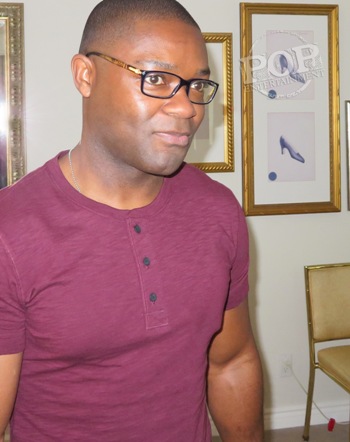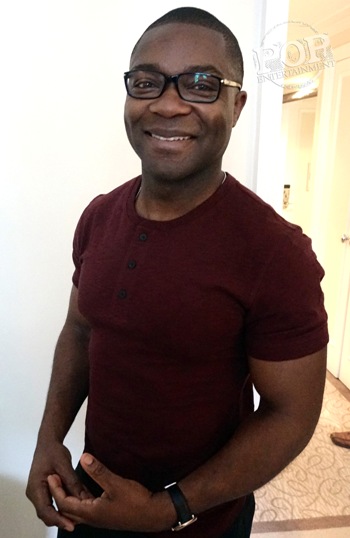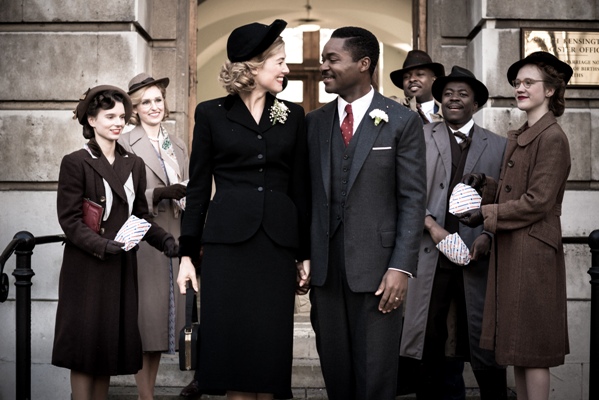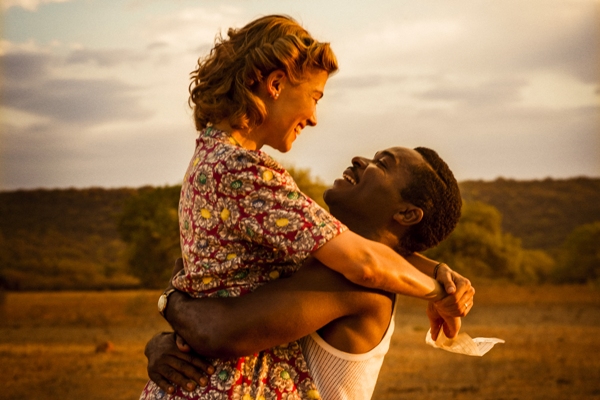David Oyelowo has been making movies for a little over a decade now, and
he seems to have carved out a special niche in Hollywood. The actor,
who was born in Oxford and lived several years in Nigeria as a boy, has
become Hollywoodís go-to choice for historical bio-dramas.
Oyelowo is probably best known for his riveting, Oscar-nominated turn as
the Reverend Martin Luther King, Jr. in Selma. That film made
Oyelowo a full-fledged star, but he had been building up to that status
with turns in as a pioneering airman in Red Tails, a soldier
watching the Gettysburg address in Lincoln, a real-life Ugandan
soccer coach and chess master in Queen of Katwe, and jazz
chanteuse Nina Simoneís manager in Nina.
Even
when his characters are not necessarily historical, often they are
surrounded by famous men of history, like the role he played as the son
of the long-time White House worker in The Butler. Of course,
some of his films have been completely fictional, like Jack Reacher,
Interstellar, Rise of the Planet of the Apes and The Help.
Oyelowoís latest historical drama is a labor of love for the actor. A
United Kingdom is the story of Seretse Khama, the crown prince and
heir to the throne of the African country of Bechuanaland, whose reign
was endangered in the 1940s when he fell in love with and married a
white British secretary. Due to societal norms, political pressure and
family disapproval, the couple had to fight to retain power of the
country and the sovereignty of his people, eventually becoming President
of the newly democratized country, which was renamed Botswana.
Actress Rosamund Pike, who played his wife Ruth Williams Khama in the
film (and had previously worked with Oyelowo in Jack Reacher),
said that working with Oyelowo made the role clear. ďMy performance is
all about David really, if Iím truthful. I didnít create it in
isolation. I created it looking at him.Ē
We
sat down with Oyelowo and some other media outlets soon before the film
was released. ďI feel like the President, with all these mics in front
of me,Ē Oyelowo said good naturedly as he walked in to the recent press
day for A United Kingdom at the Peninsula in New York. President?
Yeah, it seems only a matter of time before Oyelowo plays another one of
those.
 Youíve played some very iconic characters, obviously Khama, King and
even in
Red
Tails. When youíre doing true stories about people who have had such
important lives, how much responsibility do you feel to get their points
across and be true to their character?
Youíve played some very iconic characters, obviously Khama, King and
even in
Red
Tails. When youíre doing true stories about people who have had such
important lives, how much responsibility do you feel to get their points
across and be true to their character?
Itís
quite hazardous playing real people, especially when they are people of
historical significance. So many people have a strong opinion as to if
theyíre going to be in a film, how they should be portrayed. What it is
that they did. What it is they didnít do. Itís not like playing a
fictional character, where youíre allowed the creative license to just
[let] there be a convergence between yourself and the character. [In]
this you have to very much go to the character. What I have found to be
true is that at a certain point, having been given the opportunity, you
just have to accept that this is your interpretation of this historical
figure. If you keep on thinking about those other people, youíre going
to be paralyzed and not be able to do your job. For me playing Seretse
Khama, it was about doing all the research I could. Talking to as many
people as I could. Then at some point, youíve got to trust that thatís
in there and then go in and play the truth of given situations. What
does this person I have put together in me do when he is confronted with
Rosamund Pikeís Ruth? Or is confronted with 1,000, 2,000, 3,000 extras
and has to talk about his wife? Youíve just at some point have to let it
go and trust that you will be able to tell the truth.
How
would you compare and contrast playing these two leaders in
Selma and in this film?
I
think the primary difference, the starkest difference, is Selma
indisputably is a more political film, which also looks at the movement
and the man. Whereas this is a love story. The politics is the backdrop
in this particular film. This is more intimate. Itís more of a
character-driven narrative I would say. I love that about it. I love
that youíre getting to see the machinations between these three nations
from a political point of view, but at the end of the day itís about
these two people who fell in love and wanted to stay together and fight
for that right.
You
look so incredibly fit in this movie. Did you go and train before you
did this?
Thatís a very good and unexpected question. Well, as you see at the
beginning of the film, heís an athlete. He boxes. Boxing was something I
was doing as we were about to prepare to do the film. But I like to stay
fit. Most people became aware of me when I played Dr. King in Selma.
I gained 30, 40 pounds for that. So a lot of people, when they see me
slimmer they think, ďOh, wow, you dropped some weight.Ē Actually this is
what I like to think I look like most of the time. Anyway, yes he was a
fit guy, so I thought Iíd better do that.
 Is
it a lot less pressure, somebody so well known as Martin Luther King
versus like
Queen of Katwe, you were also playing a real person there and now
here where itís not so familiar I mean at the pictures at the end I
thought wow Rosamund doesnít look anything like Ruth.
Is
it a lot less pressure, somebody so well known as Martin Luther King
versus like
Queen of Katwe, you were also playing a real person there and now
here where itís not so familiar I mean at the pictures at the end I
thought wow Rosamund doesnít look anything like Ruth.
Itís
less pressure from the public. I donít subject myself to any less
pressure at all. For me whenever I take on a role like this, I do
anything and everything I can to do the best job I can to tell the truth
of them. At the end of the day, the pressure I put on myself far
outweighs the pressure anyone outside of me can put on me. It doesnít
feel that different, but I remember with Selma, it wasnít until
after the film was out they were like: ďOh my goodness. I was crazy.
What was I thinking?Ē Look at the amount of people who have an opinion
on this film and on this particular individual. Iím sure I wonít
experience that with this [character], but it doesnít mean I put myself
under any less pressure.
Rosamund just said that you contacted her and you said, ďDo you want to
hear about the greatest love story of all time?Ē First of all, how did
you find out about the love story? And why did you think that she would
be ideal to play Ruth?
I
found out about it while doing a film in Atlanta called 96 Minutes.
A producer called Justin Moore-Lewy, who
is also a producer on our film, had the rights to this book Colour
Bar that was written by Susan Williams. I remember I was stepping
into my trailer and he presented me with this book. I just couldnít
believe this image; this guy with a trilby and a trench coat arm and arm
with this woman. They just seemed very in love. There was just something
so intoxicating about the two of them together. When I then read the
book, I just couldnít believe I didnít know of this story, especially as
a person of African descent myself. In terms of Rosamund, we had done
Jack Reacher together, but I had been a fan of hers for a while. I
just feel like with her you can never really predict what a Rosamund
Pike performance is going to be. There are other actresses who you would
picture them as Ruth and you go: Okay, I can see what their Ruth would
be. I couldnít necessarily go: Thatís what her Ruth would be, but I knew
it would be good. I feel that about any and every one of her
performances. For me, I wanted it to be someone enigmatic. Someone who
you can believe why a man like Seretse would fall in love with her
without necessarily getting to know her that well. She has that
enigmatic quality that draws you in, so those were the reasons for which
I thought she would be fantastic.
Could you talk about the collaboration and working with [director] Amma
Asante? You worked also with Ava DuVernay in
Selma, both female directors in historic films. What made them stand
out for you as youíre compared to male directors that you had worked
with before?
Both with Selma and A United Kingdom, I had a hand in
those wonderful ladies directing those movies. With Ava, I had worked
with her on a film called Middle of Nowhere. Regardless of
whether sheís female, I just thought sheís an amazing director, and
therefore someone who I was very keen to see direct Selma. What I
learned with her directing Selma is how important the perspective
of the person who is directing is. Her perspective enabled the women in
Selma to become more three dimensional. My interaction with
Coretta Scott King in the film, before Ava came on board, was only a
phone call. I never actually was in a scene with her. The characters
that Oprah Winfrey, Tessa Thompson and Lorraine Toussaint played all
were marginal, nigh on extra roles. Supporting roles. Not even
supporting roles, just extra roles. Because she is a black woman who
recognizes how pivotal the role of women was in the civil rights
movement, she wanted to see that. What that gave my character was more
dimension, because not only saw Dr. King that political mind, we got to
see the father, the husband, the friend. So much of that was Avaís
perspective. When we were putting A United Kingdom together, I
knew that I wanted this film to be a love story, first and foremost. I
didnít want it to just feel like a political film. A lot of the men we
sat down with were more interested in the politics. Or they were
interested in this young white girl that left England and went to this
hot country. Oh my goodness, it was so hot. Wow, how hot it was. So hot.
I was like: guys, this prince is giving up his kingdom for this woman.
And Londonís quite cold actually. So their perspective was very much
what weíve seen in films so often, which is to marginalize the black
characters and probably focus more on the politics than the emotional
side. Having Amma direct it just felt it was what I always hoped it
would be, which is a love story.
 What do you think the purpose is to struggle in life? Youíve played a
lot of characters who struggle, could you imagine life without struggle?
Why do we struggle?
What do you think the purpose is to struggle in life? Youíve played a
lot of characters who struggle, could you imagine life without struggle?
Why do we struggle?
I think life would go by a different name if there wasnít struggle as a
part of it. Thatís part of the definition of what it is to be human.
Overcoming our fallibility is dependent upon how we deal with struggle.
I believe that resistance is what builds muscle. With Ruth and Seretse,
if they didnít face the opposition that they faced, I donít know that
their love wouldíve been as strong. I donít know that Botswana would
have gone on to be one of the success stories of Africa, in that they
own the bulk of their mineral resources. The lessons Seretse learned
before he then went on to become president of Botswana is that Ė to be
perfectly frank Ė the west couldnít be trusted. We have discovered
diamonds here. Iím not just going to sell out my people and let you have
all our resources. Weíre going to own the bulk of it. Weíre going to be
the driving seed of our own destiny. I donít know that that wouldíve
necessarily been the case if it had been: ďOh yeah, get married. Itís
fine. Whatever.Ē So I do believe struggle can be redemptive, depending
on how you deal with it. These two people let love be their guide, let
love be the driver of everything they did going forward. That helped
them overcome their obstacles.
The story behind
A United Kingdom took place over 50 years ago, but sadly politically
itís still very relevant. What do you think that this story can tell
people in this crazy political world now? What kind of warnings can it
give them?
I think anyone watching the news now, itís a very complicated time. Itís
overwhelming is the truth of the matter. But I do truly believe the
antidote to all of this is quite simple; itís love. That can sound a bit
corny, but when you watch a film like A United Kingdom you
literally see love in action. You see that it does have the power to
overcome political obstacles and tribal obstacles and familial
obstacles. If we as a people can basically decide that regardless of
political agendas, religious agendas Ė whatever else is out there that
is trying to divide us Ė if love is what we will lead with, I donít
think any government, any insidious agenda can overcome that, can
overwhelm that. Prejudice is born out of fear. Fear of that which is
other to you is what we are dealing with. Everything that weíre dealing
with, from the rise of nationalism to this incredibly contentious
election weíve just had. The byproduct of it is all to do with: Iím
right. Youíre wrong. Youíre different to me and my perspective and my
color and my religion and my whatever is more important, is more right,
than yours. If you are coming from a place of sacrificial love Ė of
what can I do for you? How can I help you? How can I be gracious in the
face of your seeming hate? Ė then I think that we stand a chance.
 You just did a fantastic off-Broadway performance of
Othello with Daniel Craig and Finn Wittrock. It was one of the
hottest tickets in New York. Itís in this tiny little off-Broadway
theater. Why didnít you do that on Broadway? These two movie titans
coming to the stage and people said it was one of the best Othelloís
ever seen.
You just did a fantastic off-Broadway performance of
Othello with Daniel Craig and Finn Wittrock. It was one of the
hottest tickets in New York. Itís in this tiny little off-Broadway
theater. Why didnít you do that on Broadway? These two movie titans
coming to the stage and people said it was one of the best Othelloís
ever seen.
Well, anyone who came to see the show, the few who got to see it, if you
got to see it in that 200 seat theater youíd understand why. Part of why
itís been deemed a good production is that experience, the fact that 200
people were locked into a wooden box. Rather than just observing this
play, they become part of this play. They are the court. They are the
observers. They are those who Iago is colluding with against Othello.
They are those who at the end of the play I appeal to, saying: you saw
what just happened. Surely you can understand why I did what I just did.
Regardless of their actual opinion, they are part of the play. Thatís a
very difficult thing to do in a great big tundra of a theater. That has
its place and Iím sure that we wouldíve had a nice production there. But
thatís what made it, I think, special, the intimacy of that particular
production. You had just the best time doing it as a result, because you
could see the whites of the audienceís eyes. For me, I hadnít done a
play for about ten years. What I was missing was that connection with an
audience. With film, there are so many layers between you and the
audience. With this, I could literally talk to one person while everyone
else is observing. Thereís something very pure about that from a
storytelling point of view.
Will there be a film of it?
Oh gosh, I donít know. (laughs) For me it was like a perfect
meal, where you just go: Okay, I donít need any more. I donít need any
less. Done, moving on. So weíll see, I did love doing it, so you never
know. Barbara Broccoli is a very persuasive and inventive lady.
Do you think something would be lost by seeing this film on the small
screen?
No, I donít think anything would be lost. Look. letís be honest; a lot
of people, their first introduction to A United Kingdom will be
on the small screen. [I] hope that we have made an epic movie. The
English Patient was my model for the kind of film I wanted A
United Kingdom to feel like. But you hope [when] you make a film
that anyone watching it anywhere will get something from it.
Which films do you think would make an interesting double feature with
A United Kingdom?
A film that it should be a good double feature withÖ Guess Whoís
Coming to Dinner, maybe. I only say that because itís the 50th
anniversary of that film. Itís one of the rare times since that film
that I can think of an interracial love story of what I like to think is
of scope and scale. And because I just love
Sidney Poitier.
I want to be anywhere around him. So, yeah, maybeÖ
Whatís the process of watching yourself on the screen? Are you able to
get into the story or are you still looking at your gestures? We donít
usually get the chance to look at ourselves for a long time.
Yeah, thatís very true. Some actors canít bear to watch themselves in
movies. Iím not one of them. (laughs) I actually find that I
learn quite a bit from watching myself in movies, watching how I
interact with other people. Itís a craft youíre never going to master,
unless youíre Daniel Day Lewis. For me, when Iím doing a scene there are
times where what I am trying to project, what I am trying to evoke,
isnít necessarily how it comes off on the big screen. Sometimes itís
more potent. Sometimes itís less. Sometimes itís completely other than I
thought it would be. That to me is an interesting thing to take into my
next opportunity to be on film. But it is odd. Thereís no getting away
from it. Seeing yourself projected the size of a house on a big screen
can be at times quite traumatic. But I just love the movies. I love the
fact that itís one of the only opportunities in modern day life where
you have hopefully in any way peopleís attention for about two hours.
Hopefully you can say something meaningful.
Right wing politician Tony Benn, was actually a significant key figure
in the Princeís liberation. I was curious that obviously because this
film focuses on the relationship with Ruth and the Prince. But, talk
about the relationship with the Prince and Tony Benn.
Yeah, Tony Benn did play a huge part in their story, and was a big part
in the ultimate victory that they had. You also have significant
characters, like Clement Attlee, the prime minister and Winston
Churchill. When youíre making a film, when you only have two hours to
tell a story, you have to be very judicious with where you put the
camera and who youíre focusing on. Thereís a version of the film and to
be perfectly frank if it wasnít Amma Asante, a black British woman
making this film, there is a different kind of director who this film
would be about Tony Benn and how he helped this couple to get back to
their country and be happy. Thatís not our film.
What do you look for to say yes to a role? Is it immediate often or are
you very hard to commit?
I say no a lot, much to the chagrin of my agents and maybe some other
directors who approach me. (chuckles) Anything thatís going to
take me away from my kids for two seconds better be something that makes
sense to me. I have this rule which is the three Pís: the part, the
project and the people. If the partís great thatís great. If the project
has something to say as well, thatís what Iím looking for. But really
itís about the people. I am on a quest to become a better actor. I think
the best way to do that is to surround yourself [with] people who are
better at this thing we do than you are. Those tend to be my guides as
to the kind of films I want to be part of.
CLICK HERE TO SEE WHAT DAVID
OYELOWO HAD TO SAY TO US IN 2012!
Email us Let us know what you think.